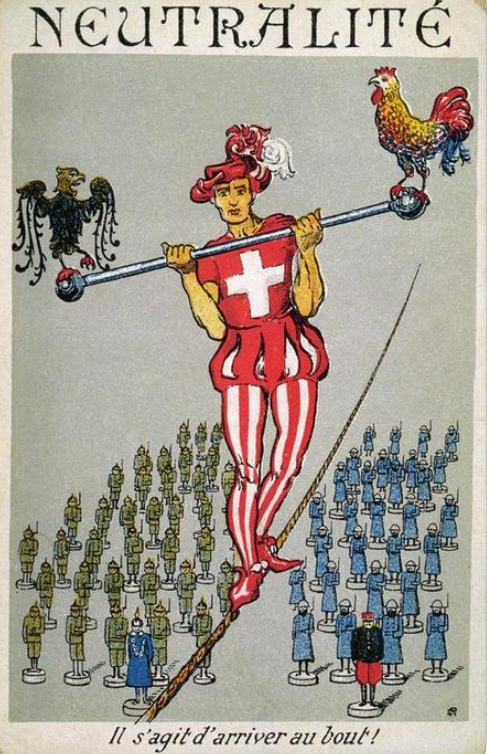The Swiss, or rather the statelet that is the legal predecessor of present-day Switzerland, always used neutrality as a means of keeping out of the wars between other, much bigger and more powerful states of more or less imperialistic inclination, refusing to ally itself with one against the other, because they saw such big powers' struggles as something where they had nothing to win and much to loose. Why side with the ones against the others if there is a third option, much more profitable and much safer, by which you're better off no matter who wins (a so-called "dominant strategy" in game theory)? Charitably understood, such neutrality does not imply (though is certainly compatible with) neither war-profiteering nor moral ambivalence. It is simply a decision not to put yourself at risk for anything else than your own, most immediate interests.
Neutrality, understood in such "Swiss" way, is essentially a stance of small countries, taken up from a position of weakness and in the face of potentially overpowering and latently or manifestly aggressive neighbours. Ukraine is such a country and it is suffering an invasion by a much stronger, aggressively imperialistic neighbour, or rather its neighbour country's kleptocratic and dictatorial regime of thieves. It is because of our neutrality, not in spite of, or as an exception to it, that we must stand on Ukraine's side in this asymmetric war. Even more than Kuwait before the first Gulf War, Ukraine deserves all the help we can give. Fighting for them, as a country, is not an option, but everything else is: we are rightly proud of the Swiss in the International Brigades in the Spanish Civil War and we have sold many many weapons to countries much worse. There are at least three ways in which Switzerland - its people, parlaments, communes and civil organisations - can help Ukraine immediately.
First, we should lay the foundations of a comprehensive and generous Marshall plan to rebuild what the Russian army is now destroying if and when Ukraine is reasonably free again. From its unique, "neutral" position outside the EU, Switzerland is uniquely well positioned to take the lead on such an initiative.
Second, we should generously supply the suffering Ukrainians, both within Ukraine and in its neighbour countries, with the one resource we have in abundance: money. A philosopher friend has made some concrete proposals to where this money can be channelled. When allowing others to do good with our money, we should not forget the Russians. Our neutrality means at least this: while we are in favour of the Ukrainians, we are not against the Russians. To the contrary: its attack on Ukraine shows that the regime the Russian peoples live under believes that it can only survive by waging external (and, given the nature of dictatorships, thus necessarily also internal) war, which all the more a reason to support, in every way we can, the Russian opposition. It is now that the many many good people in Russia can really use our support, i.e. our money, channelled to them through secret channels (we're good at this).
Third, and most importantly, we should actively seek to accommodate as large as possible a number of refugees from Ukraine (whether or not they are of Ukrainian nationality). We should publicly welcome them, help them to get to us and integrate them as quickly and fully as we can in our society. We should give them residence, work permits, health insurance, schooling and everything else they need not "temporarily" (for some fixed time, whatever it is) or "conditionally" (if there is "war" in Ukraine, however that's defined), but indefinitely and unconditionally. Many of them will return, perhaps, one day. But having them here, for now, is the best way to prepare for the future Marshall plan and the best way to make sure Ukrainian refugees in general are helped only if these new Swiss citizens have all the opportunities, rights and claims the other Swiss citizens have.
Let us welcome them, let them build their lives here. Let us not judge them, by their opinion on the war or indeed by anything else. Let them go back, if and when they choose to do so, and let us not take this very difficult decision on their behalf. Some of these new Swiss will be dealing drugs, some will be criminal, some (much worse!) will depend on social care. But so do other Swiss, and we, as a country and as a people, have plenty of resources to deal with such things. May the force be with us!
